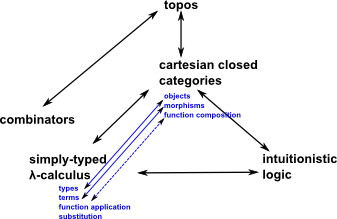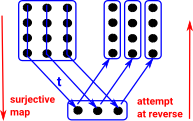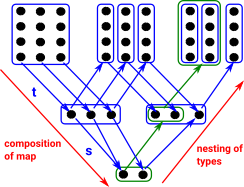Curry-Howard Correspondence
There is a relationship between computer programs and mathematical proofs, this is known as the Curry-Howard correspondence.
A type in λ-calculus has the same mathematical structure as a proposition in intuitionistic logic.
A constructor for that type corresponds to a proof of the proposition. The following table has some specific types with their corresponding propositions:
| Proposition | Type |
|---|---|
| true formula | unit type |
| false formula | empty type |
| implication | function type |
| conjunction | product type |
| disjunction | sum type |
| universal quantification | generalised product type (Π type) |
| existential quantification | generalised sum type (Σ type) |
For more information about the Curry-Howard correspondence see the page here.
λ-calculus Structure
There is more information about λ-calculus on page here but here we are interested in its basic type structure.
| We can start with some predefined type. | T |
| A function type goes from one type to another | T->S |
| We can have higher order function types which go from a function to another function. | (T->S)->(P->Q) |
| ... and so on. |
Intuitionistic Logic Structure
There is more information about Intuitionistic Logic on page here but here we are interested in its basic structure.
| We can start with a simple proposition. | A |
| Predicate calculus allows us to have conditional predicates. | if A then B |
| Again we han have higher order versions of this to any level. | if (if A then B) then (if C then D) |
| ... and so on. |
Curry–Howard–Lambek Correspondence
| We can extend this correspondence to include cartesian closed categories (CCC) in category theory. |
|

More information about:
- Cartesian Closed Categories (CCC) on page here.
- λ-calculus on page here.
- Intuitionistic Logic on page here.
| Cartesian Closed Category | λ-calculus | intuitionistic logic |
|---|---|---|
| objects | types |
proposition p = proposition P = proof of p |
Operator Types |
||
function type |
implication A implies B |
|
| product type <a,b>:A/\B |
conjunction if A is proof of 'a' and B is proof of 'b' then A/\B is proof of <a,b> |
|
| sum type a+b:A\/B |
disjunction if A is proof of 'a' and B is proof of 'b' then A\/B is proof of a+b |
|
Dependant Types |
||
| dependent product type The type of the result B(a) depends on the value a . |
universal quantification ( |
|
dependent sum type |
existential quantification ( |
|
| unit type | true formula T |
|
| bottom type | false formula _|_ |
|
Inductive Types |
||
| recursive function | inductive proof | |
| morphisms | terms | proof |
| variable | axiom | |
| constructor | introduction rule | |
| destructor | elimination rule | |
| normal form | normal deduction | |
| weak normalisation | normalisation of deductions | |
| type inhabitation problem | provability | |
| inhabited type | intuitionistic tautology | |
| function application | ||
| substitution | ||




